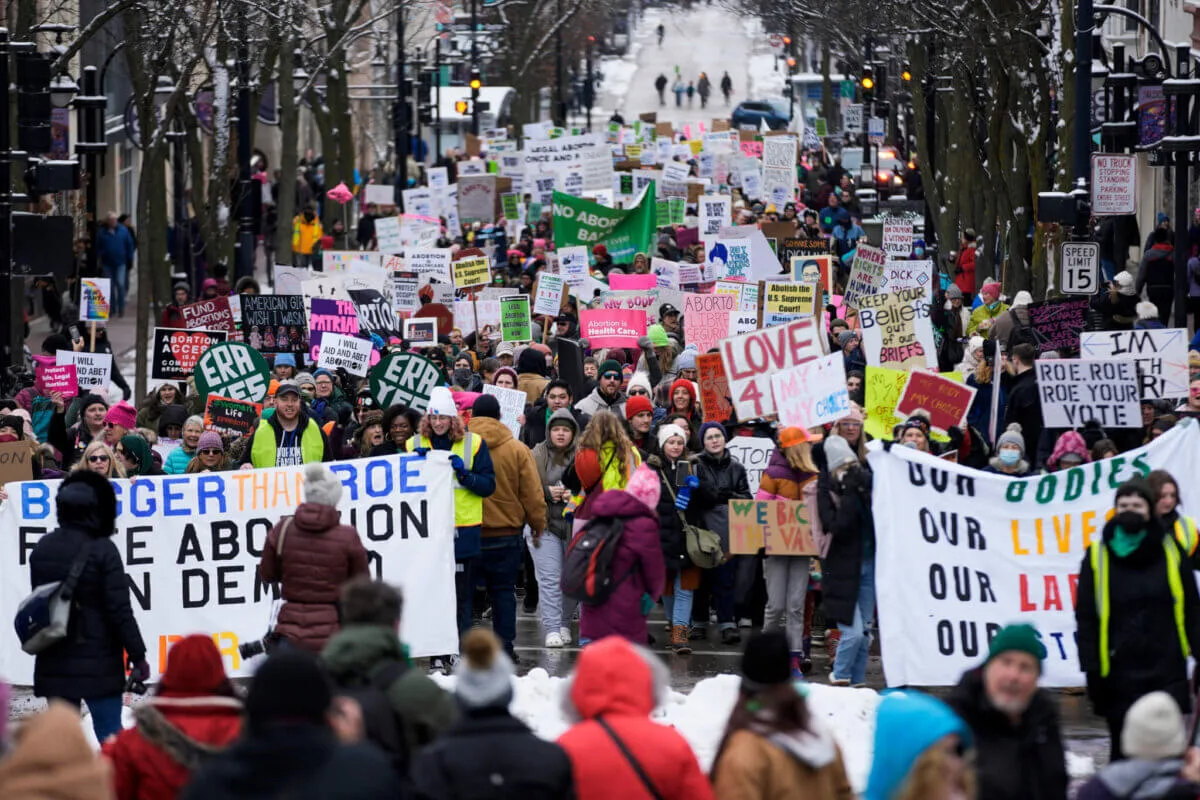
Protesters make their way to the Wisconsin Capitol Rotunda during a march supporting overturning Wisconsin's near total ban on abortion Sunday, Jan. 22, 2023, in Madison, Wis. (AP Photo/Morry Gash)
If pro-choice candidate Janet Protasiewicz wins on April 4, the state’s abortion ban—which makes no exceptions for cases of rape or incest—could be struck down, making abortion legal again. If anti-abortion judge Dan Kelly wins, he’d almost certainly be a vote to uphold the 1849 ban.
Wisconsin women have lived without reproductive freedom for the better part of a year, meaning thousands of them have either had to travel out of state for abortion care, obtain an illegal abortion, or be forced to give birth when they don’t want to.
That’s the present reality in Wisconsin, where an extreme abortion ban passed in 1849 is the law of the land. The law is so extreme that it makes no exceptions for cases of rape or incest. Under the ban, abortions are only allowed in order to save the mother’s life, and even then, only when it “is advised by 2 other physicians as necessary, to save the life of the mother.”
In other words: If you’re a pregnant woman in Wisconsin and you have a life-threatening complication from your pregnancy, a law written roughly 150 years before you were born requires two doctors—whom you’ve probably never met before—to agree that your medical condition is life-threatening enough for you to get an abortion before your own provider can treat you and prevent you from dying.
Last summer, a Wisconsin woman bled for more than 10 days due to an incomplete miscarriage because emergency room staff would not remove the fetal tissue over concerns about violating the draconian abortion ban.
The law is so archaic that it refers to these cases as “therapeutic abortions,” language that no modern provider would use. Any doctor who performs any other kind of abortion in violation of the law can be charged with a felony and face up to six years in prison and $10,000 in fines.
Wisconsin could soon restore women’s reproductive freedom, however, depending on the outcome of the upcoming April 4 state Supreme Court election.
Wisconsin Attorney General Josh Kaul, a Democrat, filed a lawsuit last summer, asking the Dane County Circuit Court to overturn the 1849 ban and instead rule that a 1985 state law that bans abortions after a fetus becomes viable outside the womb—usually around 24 weeks—supersedes the pre-Civil War era ban.
The Dane County court has yet to issue a ruling and the lawsuit is expected to reach the state Supreme Court, which is currently made up of a 4-3 Republican majority.
Candidate Janet Protasiewicz supports reproductive freedom, and if she wins, the pre-Civil War era ban could be struck down, and the 1985 law implemented in its place.
“I believe in a woman’s freedom to make her own decision on abortion,” Protasiewicz said in a recent TV ad.
If anti-abortion judge Dan Kelly wins on April 4, he’d almost certainly be a vote to uphold the 1849 ban.
In a blog post published in 2012, Kelly described abortion as “a policy that has as its primary purpose harming children” and accused pro-choice advocacy groups and Democrats of “normalizing the practice of abortion, making it culturally acceptable” in order to “preserve sexual libertinism.”
Kelly has also been endorsed by the state’s top three anti-abortion rights groups, Wisconsin Family Action, Pro-Life Wisconsin, and Wisconsin Right to Life, and has previously provided legal advice to Wisconsin Right to Life. These groups explicitly state that they only support and endorse candidates who oppose abortion rights.
“Dan Kelly was on record before the Dobbs decision, suggesting that Roe v. Wade was wrongly decided. He’s also accepted the endorsement of groups seeking to end all abortions,” Protasiewicz told UpNorthNews in a radio interview last month. “I can tell you that I am 100% certain that that ban will stay in place if… [Kelly] prevails in April.”
Nearly 60% of Wisconsin voters support abortion being legal in most or all cases, according to polls. On April 4, they may well decide the future of reproductive freedom in the state.
Politics

Biden makes 4 million more workers eligible for overtime pay
The Biden administration announced a new rule Tuesday to expand overtime pay for around 4 million lower-paid salaried employees nationwide. The...

Biden administration bans noncompete clauses for workers
The Federal Trade Commission (FTC) voted on Tuesday to ban noncompete agreements—those pesky clauses that employers often force their workers to...
Local News

Readers Poll: Top Bowling Alleys in Wisconsin
Looking for the best bowling in Wisconsin? Look no further! Our readers have spoken in our recent poll, and we have the inside scoop on the top...

8 Wisconsin restaurants Top Chef judges are raving about
Top Chef’s 21st season is all about Wisconsin, and on-screen, it’s already apparent that the judges feel right at home here. But, while filming in...





